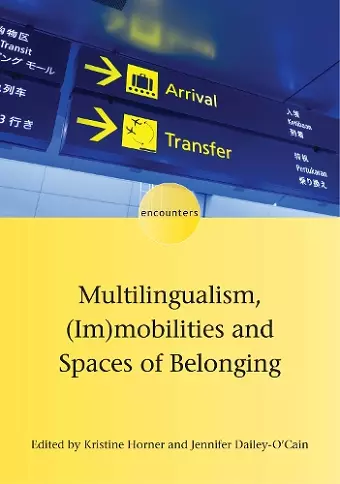Multilingualism, (Im)mobilities and Spaces of Belonging
Jennifer Dailey-O'Cain editor Kristine Horner editor
Format:Paperback
Publisher:Multilingual Matters
Published:11th Oct '19
Currently unavailable, and unfortunately no date known when it will be back

Underlines that language can be a double-edged sword in that it may be the site of struggle while also being the means to overcome struggle
The chapters in this volume investigate how diverse forms of (im)mobility and multilingualism are (re-)negotiated in relationship to space, identity and power. The volume will be of particular interest to scholars taking ethnographic and critical sociolinguistic approaches to the study of language and belonging in the context of globalisation.
Certain forms of mobility and multilingualism tend to be portrayed as problematic in the public sphere, while others are considered to be unremarkable. Divided into three thematic sections, this book explores the contestation of spaces and the notion of borders, examines the ways in which heritage and authenticity are linked or challenged, and interrogates the intersections between mobility and hierarchies and the ways that language can be linked to notions of belonging and aspirations for mobility. Based on fieldwork in Africa, Asia, Australasia and Europe, it explores how language functions as both site of struggle and as a means of overcoming struggle. This volume will be of particular interest to scholars taking ethnographic and critical sociolinguistic approaches to the study of language and belonging in the context of globalisation.
The politics of belonging: Who belongs? Who does not? Who decides? This much-needed book invites us to explore such questions by looking into the complex intersectionality of space, language, identity and power. Insightful contributions are brought together to provide rigorous and lucid sociolinguistic analyses of processes of mobility and forms of immobility in rich and varied sites.
* Adriana Patiño-Santos, University of Southampton, UK *This book uniquely challenges notions of identity, authenticity, (un)belonging and (im)mobility. Several theories and methodologies, from linguistic landscapes to discourse analysis, address contexts of borders, transnational migration, and super-mobility. In dealing with some of today’s most burning issues, including place as shifting rather than fixed, the book stresses unpredictability as key to understanding today’s world.
* Grit Liebscher, University of Waterloo, Canada *With a broad spectrum of research conducted in a wide range of contexts, this volume presents a vivid picture of multilingualism, (im)mobilities and spaces of belonging. It will serve as a highly recommended resource to readers who wish to understand the pivotal issue of language, empowerment and boundary making as well as breaking from a social-spatial perspective in the era of late modernity.
* Mingyue Michelle Gu, The Education University of Hong Kong, Hong Kong *This book offers a refreshing and much-welcomed collection of research into currently relevant topics like mobility, social stratification, and their dynamics with language (use). With a focus on qualitative research and (partially) unconventional, innovative methods, this book successfully offers meaningful insight into social dynamics, reinforcing the importance of interdisciplinary approaches.
-- Manuela Vida-Mannl, Dortmund University, Germany * LINGUIST List 31.2432 *This book will be welcomed by (early-career) researchers as a much-needed exploratory proposal to engage into the critique of ethnocentric approaches toward (im)mobilities, (un)belongings and multilingualisms by thinking of ways to frame these within the political economy of citizenship mobility regimes as exclusionary tools of power.
-- Maria Sabaté-Dalmau, Universitat de Lleida, Spain * Journal of Sociolinguistics, 20ISBN: 9781788925037
Dimensions: 210mm x 148mm x 14mm
Weight: 355g
264 pages